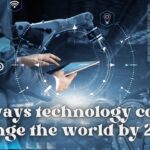In the past few decades, technological advancements have rapidly transformed the way we live and work. From the advent of the internet to the rise of artificial intelligence, revolutionary technologies are reshaping our daily routines, workplace dynamics, and even our interactions with one another. This article delves into various revolutionary technologies, examining their impacts and potential future trajectories.
The Internet: The Backbone of Modern Society
One of the most significant technological revolutions of the past few decades has been the rise of the internet. Initially designed as a communication network for the military, the internet has evolved into a global platform that connects billions of people and devices. Its impact on society is profound and multi-faceted.
Communication and Connectivity: The internet has fundamentally changed the way we communicate. Emails, instant messaging, and video conferencing allow for real-time communication across vast distances. This has enabled remote work, allowing people to collaborate from different parts of the world without the need for physical presence.
Access to Information: The internet is a vast repository of information. Search engines like Google have made it possible to access knowledge on virtually any topic in seconds. This democratization of information empowers individuals and facilitates lifelong learning.
E-commerce and Business Models: The internet has also transformed traditional business models. E-commerce platforms like Amazon and Alibaba have changed the way consumers shop, offering unparalleled convenience and choice. Businesses can now reach global markets, significantly expanding their customer base.
Artificial Intelligence: The New Frontier
Artificial Intelligence (AI) is another revolutionary technology that is transforming various sectors. With its ability to analyze vast amounts of data, learn from it, and make decisions, AI is enhancing efficiency and productivity.
Automation and Job Displacement: AI-powered automation is reshaping the workforce. While it increases efficiency and reduces costs, it also raises concerns about job displacement. Many routine tasks are being automated, prompting discussions about the future of work and the need for reskilling.
Healthcare Innovations: In healthcare, AI is being used for diagnostics, treatment recommendations, and personalized medicine. Machine learning algorithms can analyze medical images more accurately than human doctors, leading to earlier detection of diseases and better patient outcomes.
Smart Homes and IoT: The Internet of Things (IoT) is another facet of AI that is revolutionizing how we interact with our environment. Smart devices connected to the internet can automate household tasks, optimize energy usage, and enhance security. This technology not only makes our lives more convenient but also contributes to sustainability efforts.
Virtual Reality and Augmented Reality: New Dimensions of Experience

Virtual Reality (VR) and Augmented Reality (AR) are changing how we experience entertainment, education, and even work. These immersive technologies create new avenues for interaction and learning.
Education and Training: VR and AR are being used in education to create immersive learning experiences. Students can explore historical sites or conduct virtual science experiments, enhancing their understanding of complex subjects. In professional training, these technologies allow for realistic simulations, preparing individuals for real-world challenges.
Entertainment and Gaming: The gaming industry has embraced VR and AR, providing players with immersive experiences that were previously unimaginable. This has not only changed the way we play but also how we socialize, as online multiplayer games create communities that transcend geographical boundaries.
Workplace Applications: In the corporate world, VR and AR are being utilized for training and collaboration. Virtual meetings in immersive environments can enhance communication and creativity among teams, leading to better problem-solving and innovation.
Renewable Energy: A Sustainable Future
As concerns about climate change and environmental degradation grow, revolutionary technologies in renewable energy are becoming crucial for a sustainable future. Innovations in solar, wind, and battery storage are changing how we produce and consume energy.
Solar Energy Advancements: The cost of solar energy has decreased significantly, making it a viable alternative to fossil fuels. Solar panels are becoming more efficient and accessible, allowing homeowners and businesses to harness the sun’s power.
Wind Energy Growth: Wind energy is also experiencing rapid growth. Advanced turbine designs and offshore wind farms are enabling countries to tap into this renewable resource, contributing to national energy security and reducing reliance on fossil fuels.
Energy Storage Solutions: Innovations in battery technology, particularly lithium-ion and solid-state batteries, are crucial for the renewable energy sector. Efficient energy storage solutions enable the integration of renewable sources into the grid, ensuring a stable and reliable energy supply.
Biotechnology: Transforming Healthcare
Biotechnology is revolutionizing the healthcare landscape, offering innovative solutions for disease prevention, diagnosis, and treatment.
Genetic Engineering and CRISPR: The development of CRISPR technology has made it possible to edit genes with unprecedented precision. This opens doors for treating genetic disorders and developing personalized medicine tailored to individual patients’ needs.
Vaccine Development: The COVID-19 pandemic showcased the power of biotechnology in vaccine development. mRNA vaccine technology allowed for rapid production and deployment of effective vaccines, demonstrating the potential for quick responses to emerging health threats.
Telemedicine: Telemedicine has gained popularity, enabling patients to consult healthcare professionals remotely. This convenience is particularly beneficial for individuals in rural areas or those with mobility challenges, ensuring access to quality care.
Blockchain: Securing Transactions and Data

Blockchain technology is often associated with cryptocurrencies like Bitcoin, but its potential extends far beyond digital currencies. This decentralized ledger system offers secure and transparent transaction methods.
Financial Services Revolution: Blockchain has the potential to revolutionize the financial services industry. It enables secure peer-to-peer transactions without intermediaries, reducing costs and increasing efficiency. Additionally, blockchain can streamline cross-border payments, making them faster and more accessible.
Supply Chain Transparency: In supply chain management, blockchain enhances transparency and traceability. Each transaction is recorded on a tamper-proof ledger, allowing businesses to track products from production to delivery. This can reduce fraud, ensure compliance, and improve customer trust.
Data Security and Privacy: The decentralized nature of blockchain makes it inherently secure. This technology can protect sensitive data, reducing the risk of cyberattacks and ensuring privacy for individuals and organizations.
The Future of Work: Hybrid Models and Digital Nomadism
As these revolutionary technologies continue to evolve, they are reshaping the future of work. The traditional 9-to-5 office model is being replaced by more flexible arrangements.
Remote Work Culture: The COVID-19 pandemic accelerated the adoption of remote work. Companies are now embracing hybrid work models, allowing employees to work from home part-time or full-time. This flexibility enhances work-life balance and increases employee satisfaction.
Digital Nomadism: The rise of remote work has also given birth to the digital nomad lifestyle. Professionals can now work from anywhere in the world, leading to a new wave of travel and cultural exchange. This trend is reshaping cities as they adapt to accommodate a transient workforce.
Skills for the Future: As technological advancements continue, there is a growing emphasis on reskilling and upskilling the workforce. Employees must adapt to new tools and technologies to remain relevant in an evolving job market. Lifelong learning is becoming essential for career advancement and job security.
Challenges and Ethical Considerations

While revolutionary technologies bring numerous benefits, they also pose challenges and ethical considerations that society must address.
Job Displacement: As automation and AI continue to advance, there is a valid concern about job displacement. Industries must prioritize retraining programs to help workers transition into new roles and mitigate the negative impacts of technology on employment.
Data Privacy: The rise of digital technologies raises significant concerns about data privacy and security. As organizations collect and analyze vast amounts of data, individuals must ensure their personal information is protected and used ethically.
Access and Inequality: The digital divide remains a pressing issue. Not everyone has equal access to technology, and marginalized communities may be left behind in the technological revolution. Ensuring equitable access to technology and digital literacy is crucial for inclusive progress.
Conclusion
Revolutionary technologies are undeniably changing the way we live and work. The internet, AI, VR/AR, renewable energy, biotechnology, and blockchain are just a few examples of the innovations shaping our future. As we embrace these advancements, it is essential to consider the challenges and ethical implications they bring. By fostering an inclusive and sustainable approach to technology, we can harness its potential to improve our lives and create a better world for future generations. The journey of technological revolution is ongoing, and its impact will continue to evolve as we adapt to new realities and opportunities.










Leave a Reply